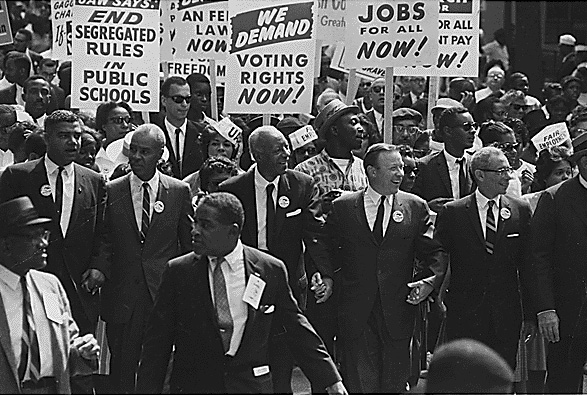PLEASE NOTE: ALL CITATIONS ARE IN MLA 7 FORMAT. THE PREFERRED FORMAT IS MLA 8. SEE OWL PURDUE FOR PROPER CITATIONS.
Books
Baraka, Amiri. (LeRoi Jones). Blues People: Negro Music in White America. New York: William Morrow, 1963.
…classic work on the place of jazz and blues in American social, musical, economic, and cultural history. From the music of African slaves in the United States through the music scene of the 1960’s, Baraka traces the influence of what he calls “negro music” on white America — not only in the context of music and pop culture but also in terms of the values and perspectives passed on through the music. -Amazon
Biondi, Martha. To Stand and Fight: The Struggle for Civil Rights in Postwar New York City. Cambridge: Harvard University Press, 2003.
The story of the civil rights movement typically begins with the Montgomery bus boycott of 1955 and culminates with the 1965 voting rights struggle in Selma. But as Martha Biondi shows, a grassroots struggle for racial equality in the urban North began a full ten years before the rise of the movement in the South. This story is an essential first chapter, not only to the southern movement that followed, but to the riots that erupted in northern and western cities just as the civil rights movement was achieving major victories. -Amazon
Brown, Claude. Manchild in the Promised Land. New York: Signet, 1965.
…this thinly fictionalized account of Claude Brown’s childhood as a hardened, streetwise criminal trying to survive the toughest streets of Harlem has been heralded as the definitive account of everyday life for the first generation of African Americans raised in the Northern ghettos of the 1940s and 1950s. -Amazon
Lincoln, C. Eric. The Black Muslims in America. Boston: Beacon, 1961.
…details the formation and development of the Black Muslim movement through its wide-ranging expressions in America today, focusing especially on Louis Farrakhan’s movement as the true successor to the original Nation of Islam founded by Elijah Muhammad. –Amazon
Malcolm X, as told to Alex Haley. The Autobiography of Malcolm X. New York: Ballantine, 1965.
In the searing pages of this classic autobiography, originally published in 1964, Malcolm X, the Muslim leader, firebrand, and anti-integrationist, tells the extraordinary story of his life and the growth of the Black Muslim movement to veteran writer and journalist Alex Haley . In a unique collaboration, Haley worked with Malcolm X for nearly two years, interviewing, listening to, and understanding the most controversial leader of his time. -Amazon
Ransby, Barbara. Ella Baker and the Black Freedom Movement. Chapel Hill: University of North Carolina Press, 2003.
In this deeply researched biography, Barbara Ransby chronicles Baker’s long and rich political career as an organizer, an intellectual, and a teacher, from her early experiences in depression-era Harlem to the civil rights movement of the 1950s and 1960s. Ransby shows Baker to be a complex figure whose radical, democratic worldview, commitment to empowering the black poor, and emphasis on group-centered, grassroots leadership set her apart from most of her political contemporaries. Beyond documenting an extraordinary life, the book paints a vivid picture of the African American fight for justice and its intersections with other progressive struggles worldwide across the twentieth century. -Amazon
Singh, Nikhil Pal. Black is a Country Race and the Unfinished Struggle for Democracy. Cambridge: Harvard University Press, 2004.
Nikhil Pal Singh asks what happened to the worldly and radical visions of equality that animated black intellectual activists from W. E. B. Du Bois in the 1930s to Martin Luther King, Jr. in the 1960s. In so doing, he constructs an alternative history of civil rights in the twentieth century, a long civil rights era, in which radical hopes and global dreams are recognized as central to the history of black struggle. -Amazon
Articles
Coates, Ta-Nehisi. “Race and Mad Men.” Atlantic. (blog post) August 17, 2009. http://www.theatlantic.com/entertainment/archive/2009/08/race-and-mad-men/23372/
Coates, Ta-Nehisi. “The Negro Don Draper.” Atlantic. October 27,2008. http://www.theatlantic.com/entertainment/archive/2008/10/the-negro-donald-draper/6129/
Colby, Tanner. “Mad Men and Black America.” Slate.com. March 14, 2012.
Demby, Gene. “Will Mad Men’s Sixth Season Finally Bring Race into the Picture?” NPR’s Code Switch blog, March 4, 2013. http://www.npr.org/sections/codeswitch/2013/04/08/176531523/will-mad-mens-sixth-season-finally-bring-race-into-the-picture.
Feldstein, Ruth. “”I Don’t Trust You Anymore”: Nina Simone, Culture, and Black Activism in the 1960s.” The Journal of American History 91.4 (2005): 1349-379. Web.
